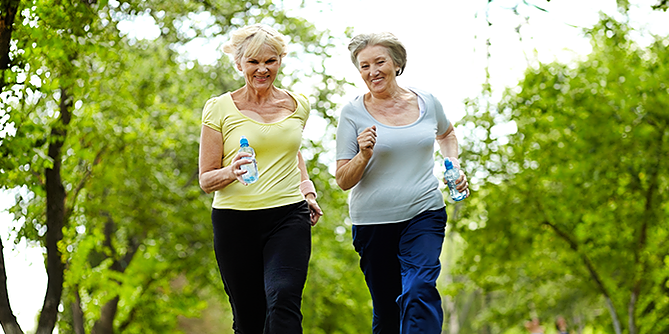Retirement may be a time for reducing your work activity but that shouldn’t stop you from remaining active physically, mentally, and socially. Quite the opposite, in fact. To enjoy the best retirement years possible, it’s important to take steps to ensure that you remain physically healthy, keep your mind sharp, and keep up your social connections. When you invest time and energy into being active in these domains, you increase the likelihood that you’ll remain healthy and able to pursue whatever your retirement goals and dreams are.
What can you expect if you remain active as you age?
Near the beginning of the 20th century, the average 65-year-old could expect to live another 13.3 years. Nowadays, life expectancy is much longer and a 65-year-old person retiring today can expect to live about 20 more years. Keep in mind that these are averages, and a healthy, active person may expect to live a life free of serious health concerns for many years beyond that.
Physical changes
- One of the inevitable changes of aging is weight gain (for most people). This happens because your metabolism slows about 5% for every decade after age 30. This means that if you keep expending the same amount of energy day-to-day, and eat the same amounts and types of foods day after day, you’ll get heavier. It’s just the way the body works. So to prevent weight gain from happening you either have to increase your activity level as you age or reduce your caloric intake. The best solution for most people is to be certain to have a moderate amount of exercise each day, and eat nutritious and balanced meals (without skipping breakfast).
- Endurance decreases with age. You might be able to swim laps or go on long hikes at age 60, but you’ll probably find it more challenging than when you were 16. That said, endurance is something you can influence. For example, brisk walking for 30 minutes or more each day can help you maintain your physical stamina and prevent premature lessening of endurance.
- We become more susceptible to a wider range of health problems as we age (e.g. cardiovascular vulnerability, musculoskeletal fragility) but you can prevent many of these changes from occurring prematurely simply by changing your behaviour. Many of the health problems you encounter with age are accelerated by poor behavioural choices (e.g., smoking, drinking too much alcohol, not exercising, overeating or making poor food choices). When you put effort towards maintaining your health, you significantly increase your chances of living longer, healthier, and remaining independent for as long as possible.
Mental changes
- Researchers have found that among older adults, the more physically active you are, and the more you challenge yourself mentally (e.g., by reading, learning, teaching) the more likely you are to preserve your memory, problem-solving, and planning skills. Even the incidence of dementia is lower in adults who stay active in their retirement years.
Mood changes
- If you allow yourself to become isolated during retirement and as you age, you can expect your mood to be negatively affected. Sometimes this negative mood can develop into a serious emotional disorder: depression.
- Being active not only strengthens your body, it also makes you feel good about yourself. When you are physically fit, socially connected, and your mind is sharp, you can accomplish your daily tasks and your retirement goals with greater ease and less fatigue.
Learn More
For more information about planning retirement, the following sites may be helpful.
- MoneySense Magazine. www.moneysense.ca
- Government of Canada: Retirement Planning. https://www.canada.ca/en/financial-consumer-agency/services/retirement-planning.html
- Sources of Retirement Income. https://www.canada.ca/en/financial-consumer-agency/services/retirement-planning/sources-retirement-income.html
- Determining how much you need for retirement. https://www.canada.ca/en/financial-consumer-agency/services/retirement-planning/money-to-retire.html
- Canadian Retirement Income Calculator. https://www.canada.ca/en/services/benefits/publicprensions/cpp/retirement-income-caltulator.html
- Government Benefits (Chttps://www.getsmarteraboutmoney.ca/plan-manage/retirement-planning/planning-for-retirement/government-benefits-cpp-oas-gis/
- How much you need to save for retirement. https://www.getsmarteraboutmoney.ca/plan-manage/retirement-planning/planning-for-retirement/how-much-you-need-to-save-for-retirement.
- An Emotional Playbook For Couples In Retirement. https://www.forbes.com/sites/nextavenue/2018/06/27/an-emotional-playbook-for-couples-in-retirement/#785284ed75ba













